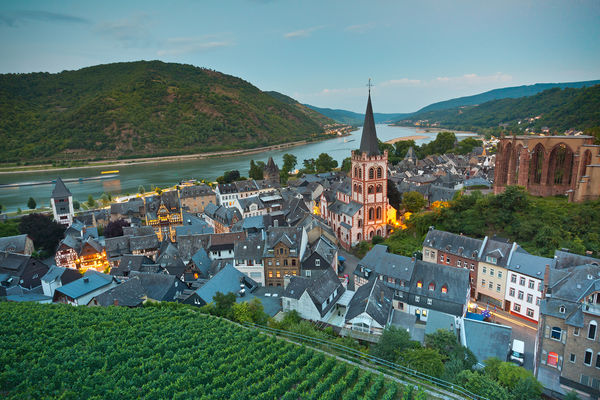Bacharach: Legends and Sagas on the Rhine
By Rick StevesCruising down the romantic Rhine River, we dodge the treacherous reefs that spelled disaster for ancient sailors distracted by the fabled Lorelei siren. We dock at the half-timbered town of Bacharach, where I jump out. Bacharach, wearing a castle helmet and a vineyard cape, is a typical Rhine village. It lines the river and fills its tiny tributary valley with a history you can hook arms with in a noisy Weinstube.
"Bacharach" means "altar to Bacchus." The town and its wine date from Celtic and Roman times. Local vintners brag that the medieval Pope Pius II preferred Bacharach's wine and had it shipped to Rome by the cartload. Today, tourists drink it on the spot.
For each wine festival, Bacharach installs an honorary party mayor. He's given the title of Bacchus. The last Bacchus, one of the best wine gods in memory, died a year ago. Posters left up seemingly as a memorial show his pudgy highness riding a keg of Riesling, wearing a tunic, and crowned with grapes as adoring villagers carry him on happy shoulders. Bacharach's annual wine fest is the first weekend of October, just before the harvest. Its purpose is to empty the barrels and make room for the new wine, a chore locals take seriously.
The festival is months away, but the dank back alleys of Bacharach smell like the morning after. I drop my bag at Hotel Kranenturm and meet my guide. As with every visit to my favorite town on the Rhine, I've arranged a private walk through town with Herr Jung, Bacharach's retired schoolmaster.
Herr Jung and I climb through the vineyards to a bluff overlooking a six-mile stretch of Rhine. "I came here often as a boy to count the ships," he says. "I once saw 30 in the river in front of Bacharach."
We look out over the town's slate rooftops. Picking up a stone, he carves the letters "Rick" into a slate step and tells me, "Now you are here, carved in stone…until the next rain."
Ever a teacher, he explains, "Slate is very soft. The Rhine River found this and carved out this gorge. Soil made from slate absorbs the heat of the sun. So, our vines stay warm at night. We grow a fine wine here on the Rhine.
"Today the vineyards are going back to the wild. Germans won't work for the small pay. The Polish come to do the work. During the Solidarity time I housed a guest worker. After 11 weeks in the fields, he drove home in a used Mercedes."
We pass under the fortified gate and walk back into town, cradled safely in half-timbered cuteness. My teacher can sense what I'm thinking: that Bacharach was never good for much more than inspiring a poem, selling a cuckoo clock, or docking a boat. Stopping at a bench, Herr Jung props his soft leather briefcase on his knee and fingers through a file of visual aids, each carefully hand-colored and preserved in plastic for rainy walks. He pulls out a sketch of Bacharach with fortifications intact and busy with trade to show how in its heyday, from 1300 to 1600, the town was rich and politically important.
"Medieval Bacharach had 6,000 people. That was big in the 15th century," he says. "But the plagues, fires, and religious wars of the 17th century ended our powerful days. Bacharach became empty. It was called 'the cuckoo town.' Other people moved in the way a cuckoo takes over an empty nest. For 200 years now, our town has been only a village of a thousand."
In the mid-19th century, painters and poets like Victor Hugo were charmed by the Rhineland's romantic mix of past glory, present poverty, and rich legend. They put this part of the Rhine on the Grand Tour map. And the "Romantic Rhine" was born.
A ruined 15th-century chapel hangs like a locket under the castle and over the town. In 1842, Victor Hugo stood where Herr Jung and I now stand. Looking at the chapel, he wrote, "No doors, no roof or windows, a magnificent skeleton puts its silhouette against the sky. Above it, the ivy-covered castle ruins provide a fitting crown. This is Bacharach, land of fairy tales, covered with legends and sagas." And, I think to myself, travelers happy to have stopped in.
This article was adapted from Rick's new book, For the Love of Europe.


